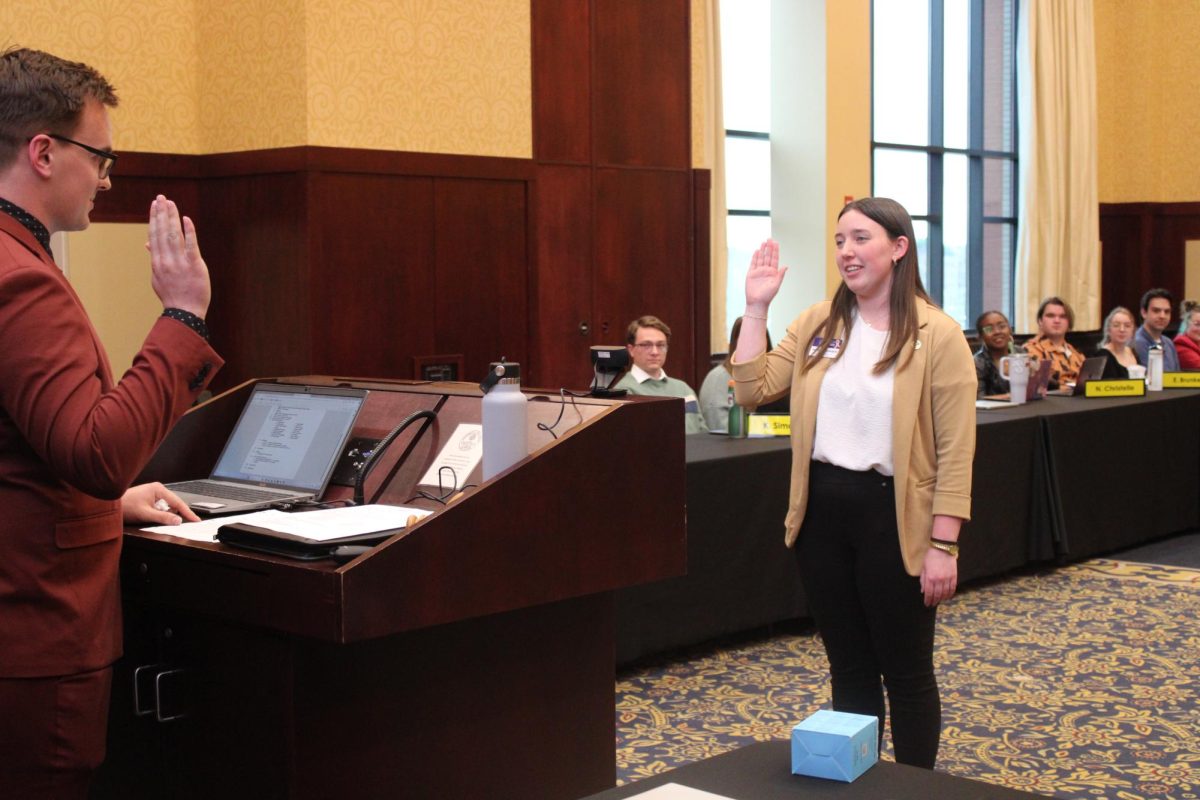A Sutherland Hall resident, who has been hospitalized with bacterial meningitis since Sunday night, is the seventh person to contract the disease in Eau Claire County since January, health officials say.
Freshman Adam Griggel, 19, is in stable but serious condition as of Wednesday afternoon at Sacred Heart Hospital, 900 W. Clairemont Ave., a hospital spokesperson said. Doctors diagnosed him with the disease after he arrived Sunday night.
Griggel is the fourth UW-Eau Claire student to catch meningitis in almost a year. Senior Tim Ruzek was treated for the disease at the start of the semester.
Two students died from meningitis last school year – Thomas Hall resident Sean Coleman in April and off-campus student Amber Krenz late last November.
Despite the number of meningitis cases reported in the county, it is not an outbreak, said Jim Ryder, director of Eau Claire City-County Health Department.
Seven cases in the county is unexpected, but it is just an abnormal statistic at this time, Ryder said.
Every case investigated so far has been unrelated, he said.
The test results of Griggel’s meningitis case were unavailable Tuesday.
“It’s unexplainable why we have been hit so hard by meningitis,” said Laura Chellman, director of Student Health Service.
Chellman said symptoms of meningitis include a sudden onset of a severe headache, stiff neck, fever or vomiting.
With Griggel’s case, if students feel they were exposed to or at risk of contact with his saliva or respiratory discharge, they should contact Health Service immediately, Chellman said.
The antibiotic Cipro is available for free to students who have been in close contact with Griggel, Chellman said.
The university’s administrators are taking the advice of health officials to decide any actions it has to take, said Mike Rindo, executive director of university communications.
“The university can’t act unilaterally,” Rindo said. “We have to work with health officials.”
Meningococcal disease is caused by bacterium spread by intimate contact with another’s saliva or respiratory secretion. The bacteria can be spread by sharing drinks, cigarettes or kissing, according to a Health Service fact sheet on meningitis.
Meningitis is an infection of the brain and spinal cord coverings, and it can lead to blood infections. Of those people with the disease, 10 to 15 percent of them die from it, in spite of antibiotics, according to Health Service information.
Griggel had gotten back from spending Halloween weekend in Madison with his Eau Claire friends. Sophomore Joe Ramy said they noticed Griggel had bruises covering his left arm.
Three hours later, they arrived on campus and the bruises had spread all over Griggel’s body. His friends say he was very tired, complained of being too hot and was too sore to move. His friends then rushed Griggel to Sacred Heart where he was diagnosed with bacterial meningitis. All of the friends who drove from Madison with Griggel, including his roommate, freshman Ben Seume, received antibiotics.
Freshmen in the dorms are statistically at a higher risk of contracting the disease, Ryder said.
Students also can prevent infection by avoiding the exchange of saliva with others, health officials said.
College students probably don’t want to hear this, Ryder said, but kissing, sharing water, sharing food and sharing cigarettes increase the risk of getting the bacteria.
“Ten to 15 percent of the population has the bacteria, but are not ill,” Ryder said.
Chellman said if students think they have been exposed to the disease, they should get the antibiotic, even if they have had the vaccine in the past.
The bacteria exist in five strains, known as sero groups. The vaccine is designed to protect against four of the sero groups. None of the Eau Claire cases have been from the sero group not covered by the vaccine, Ryder said.
Health Service routinely offers the vaccine Menomune for $70. A common side effect of the vaccine is soreness around the sight of injection, but Chellman said other side effects, specifically a fever, are rare.
“[The vaccine] has an efficiency rate quite high,” said Ryder, who added that it is near 90 percent.






